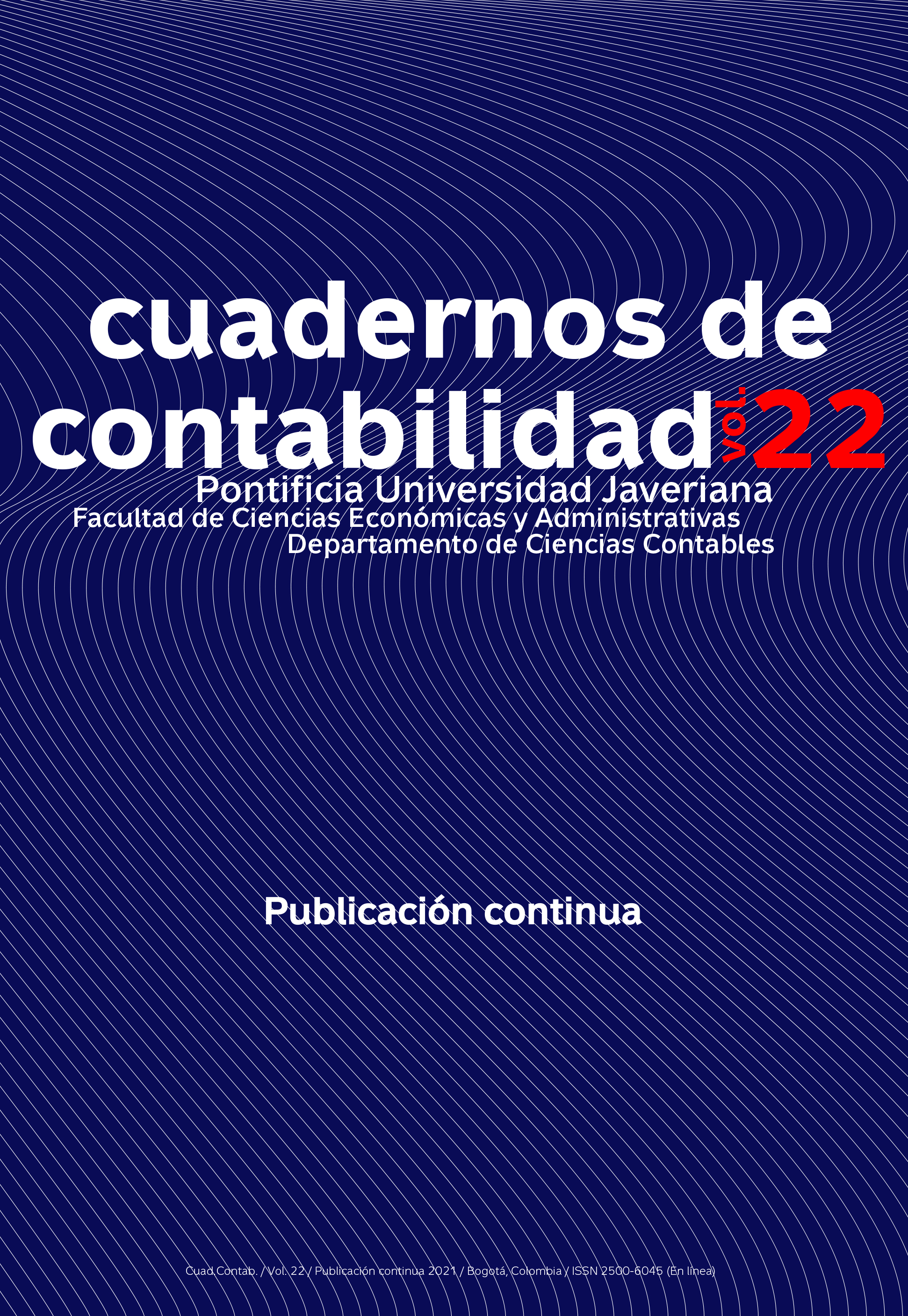Abstract
The practice of accounting professionals within private and public organizations has taken on a significant role in recent years, since it has migrated from the context of bookkeeping to a more strategic scenario. However, the performance of the accountant has been questioned within the framework of his social function as a guarantor of public trust and in a particular way of the “public interest”, through an integrated professional conduct, ethical conduct in accordance with the principles and a guarantee of transparency of financial information, which serves the decision-making of a wide group of users. This work aims to reflect on the role of the public accountant in his role of guaranteeing public confidence. The research is descriptive with a qualitative approach, based on a survey applied to 216 professionals selected in a non-probabilistic manner, and who are asked their opinion in relation to their ethical performance and their social function in organizations. The results show, for example, that 85.3% of respondents agree that accountant ethics are threatened by the particular interests of private enterprise, and 65.9% say that the principle of mental independence is not guaranteed.
Aguirre, R. J. (2012). Contabilidad: entre la responsabilidad social y el interés público. Criterio Libre, 10(17), 220-234. https://revistas.unilibre.edu.co/index.php/criteriolibre/article/view/1149
Angulo, J. A. G., & Garvey, A. M. (2009). Ética y enseñanza de la contabilidad (una propuesta de discusión). Contaduría Universidad de Antioquia, (50), 11-42. https://revistas.udea.edu.co/index.php/cont/article/view/2120
Aristóteles. (Siglo IV a.c). Ética a Nicómaco.
Backof, J. F., & Martin, C. L. (1991). Historical perspectives: development of the codes of ethics in the legal, medical and accounting professions. Journal of Business Ethics, 10(2), 99-110. https://doi.org/10.1007/BF00383613
Baker, M., & Maier, C. (eds.). (2014). Ethics and the Curriculum: Critical Perspectives. Routledge.
Bedoya, J. P., & Arroyave, J. Á. (2013). Del Contador Público y la ética profesional: un dilema inmerso en un ambiente saturado de conflictos morales. Contaduría Universidad de Antioquia, (63), 127. https://revistas.udea.edu.co/index.php/cont/article/view/24102/19727
Blanco Luna, Y. (2004). Manual de auditoria y revisoría fiscal, 8ª ed., Eco ediciones.
Bustamante, H. (2010). El interés público en la nueva base institucional de la regulación contable en Colombia. Comentarios generales a propósito del proceso de convergencia hacia estándares contables internacionales. Contaduría Universidad de Antioquia (56), 81-104. https://revistas.udea.edu.co/index.php/cont/article/view/14694/12847
Cicerón, M. T. (1818). La república. Imprenta de Repullés.
Congreso de la República. Ley 43 de 1990. Profesión del Contador Público y otras disposiciones, pp. 1-2.
Corte Constitucional (2000). Sentencia C-530 de 2000. Diario Oficial. Bogotá: Corte Constitucional – Sala Plena.
Cortina, A., Orts, A. C., & Navarro, E. M. (1996). Ética, Vol. 4. Ediciones Akal.
Davenport, L., & Dellaportas, S. (2009). Interpreting the public interest: A survey of professional accountants. Australian Accounting Review, 19(1), 11-23. https://doi.org/10.1111/j.1835-2561.2008.00041.x
Donaldson, T., & Preston, L. E. (1995). The stakeholder theory of the corporation: Concepts, evidence, and implications. Academy of Management Review, 20(1), 65-91. https://doi.org/10.2307/258887
Esteban, E. G. (2007). La teoría de los” stakeholders”: un puente para el desarrollo práctico de la ética empresarial y de la responsabilidad social corporativa. VERITAS: Revista de filosofía y teología, (17), 205-224.
Frankel, M. S. (1989). Professional codes: Why, how, and with what impact? Journal of Business Ethics, 8(2-3), 109-115.
Hernández S., R., Fernández C., C., & Baptista L., P. (1998). Metodología de la investigación (pp. 15-40). México: McGraw-Hill.
IFAC (2012). Resumen de posición de la política número 5, recuperado de www.ifac.org
IFAC (2015). Manual de Pronunciamientos Internacionales de Formación. https://www.ifac.org/system/files/publications/files/Manual-de-Pronunciamientos-Internacionales-de-Formacion-Edicion-2015.pdf
IFAC (2017). Los contadores prestan una ayuda crucial a la hora de reducir la corrupción global. El Contador Público, p. 24.
Jamal, K., & Bowie, N. E. (1995). Theoretical considerations for a meaningful code of professional ethics. Journal of Business Ethics, 14(9), 703-714. https://doi.org/10.1007/BF00872324
Leitão Azevedo, R. F., & Cornacchione Junior, E. B. (2012). Ética Profesional contable: Un análisis visual de la percepción pública. Revista de Educação e Pesquisa em Contabilidade, 6(1). https://www.redalyc.org/articulo.oa?id=441642775003
Lindblom, C. K., & Ruland, R. G. (1997). Functionalist and conflict views of AICPA code of conduct: Public interest vs. Self interest. Journal of Business Ethics, 16(5), 573-582. https://doi.org/10.1023/A:1017950006942
Maldonado, S. (2002). La contabilidad: un área del conocimiento de alto contenido ético y cultural. Cuadernos de Contabilidad, 13(16), 121-140.
Parker, L. D. (1994). Professional accounting body ethics: In search of the private interest. Accounting, Organizations and Society, 19(6), 507-525. https://doi.org/10.1016/0361-3682(94)90021-3
West, A. (2017). The ethics of professional accountants: An Aristotelian perspective. Accounting, Auditing and Accountability Journal, 30(2), 328-351. https://doi.org/10.1108/AAAJ-09-2015-2233

This work is licensed under a Creative Commons Attribution 4.0 International License.
Copyright (c) 2021 Rafael Humberto Pinzón Alfonso, Andrés David Serrato Guana


